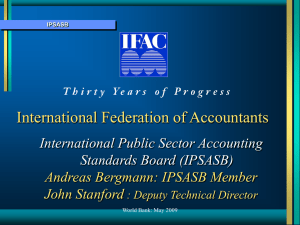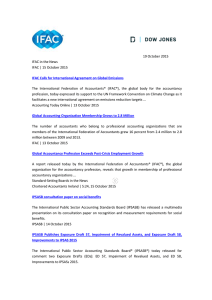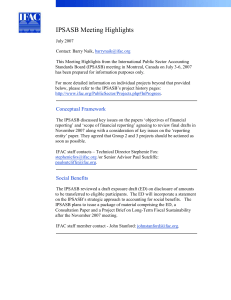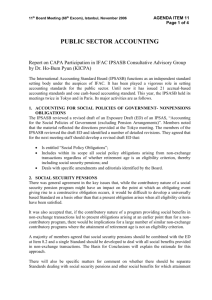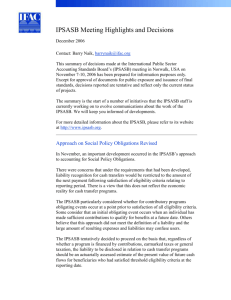29 April 2014 Jón R. Blöndal
advertisement
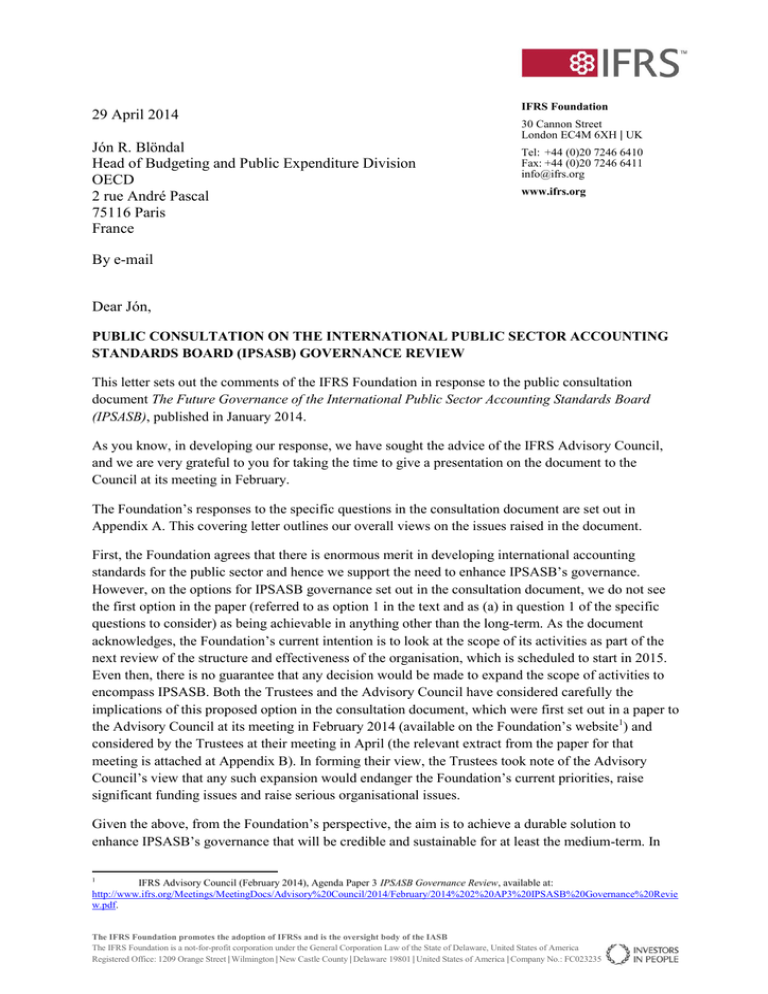
29 April 2014 Jón R. Blöndal Head of Budgeting and Public Expenditure Division OECD 2 rue André Pascal 75116 Paris France IFRS Foundation 30 Cannon Street London EC4M 6XH | UK Tel: +44 (0)20 7246 6410 Fax: +44 (0)20 7246 6411 info@ifrs.org www.ifrs.org By e-mail Dear Jón, PUBLIC CONSULTATION ON THE INTERNATIONAL PUBLIC SECTOR ACCOUNTING STANDARDS BOARD (IPSASB) GOVERNANCE REVIEW This letter sets out the comments of the IFRS Foundation in response to the public consultation document The Future Governance of the International Public Sector Accounting Standards Board (IPSASB), published in January 2014. As you know, in developing our response, we have sought the advice of the IFRS Advisory Council, and we are very grateful to you for taking the time to give a presentation on the document to the Council at its meeting in February. The Foundation’s responses to the specific questions in the consultation document are set out in Appendix A. This covering letter outlines our overall views on the issues raised in the document. First, the Foundation agrees that there is enormous merit in developing international accounting standards for the public sector and hence we support the need to enhance IPSASB’s governance. However, on the options for IPSASB governance set out in the consultation document, we do not see the first option in the paper (referred to as option 1 in the text and as (a) in question 1 of the specific questions to consider) as being achievable in anything other than the long-term. As the document acknowledges, the Foundation’s current intention is to look at the scope of its activities as part of the next review of the structure and effectiveness of the organisation, which is scheduled to start in 2015. Even then, there is no guarantee that any decision would be made to expand the scope of activities to encompass IPSASB. Both the Trustees and the Advisory Council have considered carefully the implications of this proposed option in the consultation document, which were first set out in a paper to the Advisory Council at its meeting in February 2014 (available on the Foundation’s website1) and considered by the Trustees at their meeting in April (the relevant extract from the paper for that meeting is attached at Appendix B). In forming their view, the Trustees took note of the Advisory Council’s view that any such expansion would endanger the Foundation’s current priorities, raise significant funding issues and raise serious organisational issues. Given the above, from the Foundation’s perspective, the aim is to achieve a durable solution to enhance IPSASB’s governance that will be credible and sustainable for at least the medium-term. In 1 IFRS Advisory Council (February 2014), Agenda Paper 3 IPSASB Governance Review, available at: http://www.ifrs.org/Meetings/MeetingDocs/Advisory%20Council/2014/February/2014%202%20AP3%20IPSASB%20Governance%20Revie w.pdf. The IFRS Foundation promotes the adoption of IFRSs and is the oversight body of the IASB The IFRS Foundation is a not-for-profit corporation under the General Corporation Law of the State of Delaware, United States of America Registered Office: 1209 Orange Street | Wilmington | New Castle County | Delaware 19801 | United States of America | Company No.: FC023235 our view, we think that option 2 (referred to as (b) in question 1) as set out in the document could provide a practical solution. While we acknowledge that there could be a perception issue of IPSASB remaining under the auspices of IFAC, we note that the standard-setting bodies subject to PIOB oversight also remain within IFAC. With public sector-specific monitoring and oversight, we think that this perception can be overcome. That monitoring and oversight would best be provided by the international treaty and other organisations represented on the IPSASB Governance Review Group, with the possible addition of the United Nations (which is responsible for national accounts’ standardsetting and where the UN Conference on Trade and Development, UNCTAD, in particular, has played a role on accounting standards issues for a number of years). The organisations, in particular those of the joint Chairs of the Review Group, already have the relevant expertise in public sector accounting issues, have a specific interest in seeking to further improve fiscal transparency across all economies, including through the development of a global architecture of fiscal transparency norms and standards such as IPSASs2 and would provide the political legitimacy and the incentive that is needed for such a sensitive undertaking. As suggested in the consultation document, we think that the monitoring and oversight functions could be carried out by a single body. Such a body would, in our view, help to provide credibility and legitimacy to the standard-setting activities of the IPSASB. Within this option, the current liaison arrangements between IPSASB and the IASB, as set out in the current Memorandum of Understanding (MoU) between IFAC and the IASB, would continue. The MoU sets out the relationship between the IPSASB and the IASB, including regular liaison meetings between the two Boards, the IASB having observer status at IPSASB meetings, and provision for input to be given by the technical staff of the IASB to specific IPSASB technical projects. Yours sincerely, Michel Prada Chairman of the Trustees IFRS Foundation 2 Hans Hoogervorst Chairman of the IASB See, for example, the IMF staff paper Fiscal Transparency, Accountability and Risk dated August 2012, at: https://www.imf.org/external/np/pp/eng/2012/080712.pdf. Appendix A IPSASB Governance Review Group: Specific Questions to Consider Question 1: Do you agree there is a need to strengthen the monitoring and oversight of the IPSASB? If so, do you favor: a. Monitoring and oversight of the IPSASB by the IFRS Foundation’s Monitoring Board and Trustees? b. Separate monitoring and oversight boards for the IPSASB, while it remains under the auspices of the IFAC? c. Reestablishing the IPSASB outside of IFAC with its own monitoring and oversight bodies? d. Another approach, including some combination or sequenced implementation (e.g., short-term/long-term approaches) of the above options? If so, please describe. The IFRS Foundation agrees that there is a need to strengthen the monitoring and oversight of the IPSASB. This has been an issue for some years, starting with the recommendation of the Likierman Review in 2004 that the then IFAC Public Sector Committee (PSC) should be brought within the scope of the Public Interest Oversight Board (PIOB). That recommendation was not pursued and, as the Review Group’s consultation document acknowledges, concerns about the governance and oversight of the IPSASB are among the reasons cited by national authorities for not adopting IPSASs. It has also been a factor in the decision by the European Union (EU) to develop European Public Sector Accounting Standards (EPSAS), with its own monitoring and oversight arrangements. In terms of the options outlined by the Review Group, the IFRS Foundation does not view (a) as being feasible or achievable, at least in the short to medium term. The Trustees have examined this issue in each of the reviews of the organisation that they have carried out, most recently in the Trustees Strategy Review 2011, with an intention to look at it again in the next review of the structure and effectiveness of the IFRS Foundation, which is planned for 2015. As highlighted in the covering letter and Appendix B, the Trustees have reached this view having looked closely at the implications of this option. As outlined in the covering letter, in our view option (b) above provides for a feasible and durable solution, with a single monitoring and oversight body. Question 2: Do you agree with the proposed remit for the IPSASB monitoring and oversight body(ies) in section IV, paragraph A? Are there other issues that should be addressed? The proposed remit looks acceptable as far as it goes, but is incomplete. For example, item (iii) should be disaggregated, as in our view it deals with three different issues (strategy, work programme and budget). We also think that the monitoring and oversight body should take on the responsibility of establishing IPSASB’s operating procedures, consultative arrangements and due process, although in the first instance IPSASB’s current arrangements could be ‘grandfathered’, and reviewing compliance with them. In articulating the distinct parts of the remit, we would encourage the Review Group to look at those parts of the IFRS Foundation’s Constitution that set out the powers and duties of the Trustees (see Sections 12, 13 and 15 in particular) and the responsibilities of the Monitoring Board (section 19), with further details of the duties of the latter being set out in a Memorandum of Understanding (MoU) In terms of other issues, the remit as outlined in the consultation document implies that ensuring that the public interest is served is part only of the monitoring function. A commitment to act in the public interest should pervade all levels: standard-setting; oversight; and monitoring, and this should be made clear. Question 3: Do you agree with the proposed composition of the IPSASB monitoring body in section IV, paragraph B? Are there any other institutions or stakeholders who should be represented? Question 4: Do you agree with the proposed composition of the IPSASB oversight body in section IV, paragraph B? In addition to the public sector background, are there any other competencies, interests, or stakeholders who should be represented? Our views on the composition of the IPSASB monitoring and oversight body are set out in the covering letter. We note that, in relation to the proposed composition of the monitoring body, the consultation document states that users of public sector financial information are numerous, with diverse interests. However, it makes no mention of the fact that IPSASB itself, for the purposes of its Conceptual Framework3, identifies the primary users of General Purpose Financial Reports (GPFRs) as service recipients and their representatives and resource providers and their representatives. Question 5: Are there any other aspects related to the governance of the IPSASB which you believe the Review Group should consider before presenting its final recommendations? If so, please describe. The consultation document is unclear on whether the responsibility for funding IPSASB should also be the responsibility of the monitoring and oversight body. Ideally, this would be the case, but it does bring with it significant challenges. An advantage of option 2, as acknowledged in the consultation document, is that it is expected that the current funding of IPSASB’s activities could be maintained. 3 IFAC (January 2013) The Conceptual Framework for General Purpose Financial Reporting by Public Sector Entities, available at: http://www.ifac.org/sites/default/files/publications/files/Public%20Sector%20Conceptual%20Framework%20Ch%20%2014%20Jan%20%2011%202013%20FINAL.pdf. Appendix B Extract from paper presented to the IFRS Foundation Trustees: April 2014 Option 1 – Possible Implications for the IFRS Foundation 1. Option (1) (extending the scope of the remit of the IFRS Foundation and the Monitoring Board to encompass IPSASB) would have significant implications for the Foundation and the Monitoring Board. The Monitoring Board is considering its proposed position on the consultation document and a representative from the secretariat was present at the Advisory Council meeting in February. In February, the staff sought the views of Council members on the issues outlined in the consultation document and the implications for the IFRS Foundation of Option 1, in particular on the following areas: The Foundation’s current mission: Has anything changed since the Strategy Review? 2. The Foundation’s primary objective, as set out in the Constitution and reaffirmed in the Strategy Review, is to develop a single set of high quality globally accepted financial reporting standards that should serve investors, other participants in the world’s capital markets and other users of financial information in making informed resource allocation and other economic decisions. Some take the view that the current mission does, and should, incorporate the public sector, not least given the market for government securities, and the need for high quality financial reporting in that sector. This is a theme of Kevin Stevenson’s presentation to the Trustees at this meeting. However - as evidenced at the Advisory Council discussion in February (see below) this is not a majority view. 3. In the staff’s view, the situation has not changed since the conclusion of the Trustees’ Strategy Review, such that the Foundation should accelerate any consideration of expanding the scope of its mission in line with Option 1. The IASB’s current agenda remains a work-in-progress, with a number of important convergence projects still to be completed, and the Trustees have been kept updated on the challenges and problems in achieving it. 4. In addition, the specific issue of the governance of IPSASB has been outstanding for around a decade. The consultation document also emphasises the need for improvements to be made in public sector financial reporting practices in the wake of the financial crisis, referring to (in Appendix B to the document) the call from the G20 in February 2013 for the IMF and the World Bank to look at the transparency and comparability of public sector reporting4. But again, the issues regarding public sector financial reporting in general have not changed since the Strategy Review report. Political challenges: legitimacy 5. One of the issues IPSASB has faced is in gaining legitimacy and authority for its standards. As the consultation document makes clear, that has had an impact on national authorities not adopting IPSASs. That said, in many jurisdictions, responsibility for public sector financial reporting rests with governments, which may not want to cede that responsibility, in particular to a private sector entity. As a private sector organisation with a public interest mission, the IFRS Foundation has faced and 4 eng.asp. G20 Finance Ministers and Central Bank Governors Moscow Communiqué, paragraph 10, http://www.fin.gc.ca/n13/13-025- is still facing similar challenges. We have been working hard over the past years to achieve legitimacy and authority, as witnessed by the number of jurisdictions that now require or permit the use of IFRS. Achieving legitimacy and authority for IPSASs would be even more challenging, as would be the risks of politicisation of the standards. The challenge is made even more daunting given the fact that a major jurisdiction (the EU) is proposing to adopt a different approach, even if it envisages close co-ordination with the IPSASB. Funding and operational challenges 6. The consultation document makes a brief number of references to funding. Interestingly, it does not refer to funding as coming within the remit of the proposed monitoring and oversight bodies. It is therefore not clear whether the responsibility for funding IPSASB would remain with IFAC, whichever option for monitoring and oversight is followed. But this is a fundamental issue. 7. In the option of extending the scope of the remit of the IFRS Foundation and the Monitoring Board to encompass IPSASB, the Review Group takes the view that costs of the IPSASB oversight would only be “incremental” to those already being incurred. However, the Review Group acknowledges that the additional costs would need to be met for which no immediate source of funding is available. Looking at the costs of the PIOB as a precedent, in 2012 its total expenses were €1.4 million5 (around £1.17 million), which we would see as being more than “incremental”. 8. In the staff’s view, responsibility for funding should rest with the oversight and monitoring functions. But we recognise that under Option 1 this has significant implications for the Foundation, particularly if it took on responsibility for IPSASB to achieve synergies between standards for the private and public sectors (see below). The consultation document notes that IPSASB’s total budget in 2012 was US$2.3 million in 2012, with half the funding being provided by IFAC member bodies, around a quarter from the Government of Canada and CPA Canada, with the balance coming from smaller contributions (including from the Asian Development Bank, the New Zealand Government and the World Bank). IPSASB has faced, and continues to face, significant challenges in raising funding and the current level of funding is very much at the low end of the scale for operating an effective board. It is also the case that the IFRS Foundation also faces significant on-going challenges in securing stable and sustainable funding for its existing activities, and adding any responsibility for funding IPSASB activities (even if only for oversight) would add to those challenges. Without an assurance on the future funding of IPSASB itself being made, we think it is difficult to see how Option 1 can work effectively. In our view, this is an important point that the Foundation should emphasise in its response to the consultation document. Operational challenges 9. The consultation document is largely silent on the operational challenges that Option 1 would present. Even if only responsibility for governance and oversight came within the Foundation, there would be implications for staffing, procedures and associated resources in servicing the expansion in responsibilities. If responsibility for IPSASB also came within the Foundation, we believe that the operational implications would be 5 PIOB Financial Statements 2012, available at: http://www.ipiob.org/media/files/attach/Financial_Statements_PIOB12.pdf. significant, at both the operational and technical levels. For example, the Trustees would become responsible for the nomination and appointment of IPSASB members (who are currently part-time and whose costs are mostly borne by the members or their nominating organisations, with only the possibility of the travel expenses of the 3 public members of IPSASB being covered by IFAC). The staffing would also need to be re-examined: the IFRS Foundation currently employs around 70 technical staff; IPSASB has around 7. Other implications and challenges Governance: The Foundation’s public accountability link to the Monitoring Board 10. The consultation document notes that a desirable characteristic of a standard-setting model is accountability to the public interest. We agree. The Monitoring Board provides that accountability link for the IFRS Foundation. It was established specifically to establish a formal relationship between capital markets authorities and the Foundation in line with our capital markets mission as outlined above. The Review Group acknowledges that the composition of a monitoring body in respect of IPSASB “is more complex”. The Monitoring Board is currently working through the implementation of the recommendations of its review of the Foundation’s governance in 2012, in particular in expanding its membership and working on its approach to assess current and prospective Monitoring Board members against its membership criteria. Nonetheless, the Monitoring Board as it is presently constituted is focused on financial markets regulation and composed of securities regulators. The implications and challenges of Option 1 for the Monitoring Board and its formal relationship with the Foundation would need to be considered carefully, including the issue of whether it would be feasible to have one Monitoring Board covering both the IASB and IPSASB, or whether should there be two parallel boards and how the representation of authorities having competence with regard to public sector finance would be achieved. Governance: The Trustees’ oversight 11. The consultation document proposes that the oversight body should comprise individuals who have both an appropriate technical competence in the accounting and financial reporting area, and recognised experience of the public sector. At present, the IFRS Foundation Trustees comprise 22 individuals who are selected for their understanding of, and sensitivity to, the challenges associated with the adoption and application of high quality global accounting standards developed for use in the world’s capital markets and by other users of corporate accounts. The IFRS Foundation Constitution (Section 7) requires that the Trustees “shall comprise individuals that, as a group, provide an appropriate balance of professional backgrounds, including auditors, preparers, users, academics, and officials serving the public interest”. 12. The staff are aware that there are a number of national precedents where one oversight body covers standard-setting in both private and public sectors (such as the USA and Australia, although in the US there is a separate, specific body dealing with standardsetting for the Federal Government), but models vary around the world, with responsibility for public sector standard-setting and any oversight often remaining within the preserve of governments. The varying models appear not to be dependent on whether the jurisdiction is supportive or not of long-term convergence between standards for the private and public sector. 13. Option 1 would have implications for the composition of the current body of Trustees and how an appropriate balance might be struck so that the Trustees as a group would reflect a suitable experience of the public sector. Would there, for example, need to be a separate public sector sub-committee of the Trustees, or a parallel body of Trustees? Making any change to the Trustees would be a constitutional issue and, in the staff’s view, the appropriate process to consider any such change would be as part of the next review of the IFRS Foundation, which is scheduled to start in 2015. Technical issues 14. The consultation document focuses on the governance and oversight of IPSASB. If Option 1, as limited to governance and oversight, was pursued it would have implications, but they could be managed in line with the current liaison arrangements between the IASB and IPSASB. The IASB-IFAC MoU also contains a provision that, in the medium to longer term, the two boards will mutually consult on projects where both parties are likely to benefit from consideration of both private and public sector perspectives. The technical staff are starting to liaise with their counterparts at IPSASB on their respective projects on emission trading schemes. 15. More broadly, there is a view that combining responsibility for standard-setting for both the public and private sectors would bring with it advantages of synergy. But that is not the focus of the present consultation. General views on the consultation document 16. The Review Group takes the view that national standard setters for the public sector are often inherently conflicted on a standard-setting body by the fact that they are working under the auspices of ministries of finance that are subject to these standards (consultation document, page 12). But the consultation document also notes (on page 5) that standards in certain areas (such as fiscal transparency) are set by the relevant international treaty-based organisation body (the IMF in the case of fiscal transparency), going on to state that the “legitimacy and authority of these standards derive from that granted to these organisations by the national governments who are their members, and who participate in their governance”. 17. The consultation document focuses on concerns about the governance and oversight of IPSASB being among the reasons for national authorities not adopting IPSASs (consultation document, page ii), but as noted in the European Commission documents (which propose the development of European Public Sector Accounting Standards, EPSAS), there are other significant challenges and issues that prevent them from adopting IPSASs. 18. The staff view is that there is also a need to consider carefully the main implications of the EU’s decision to develop EPSAS, rather than adopt IPSASs, bearing in mind that the EU’s decision in 2002 to adopt IFRS (as adopted in the EU) from 2005 provided a major catalyst to the adoption of IFRS around the globe. Advisory Council discussion 19. The IFRS Advisory Council considered the consultation document and all the issues outlined above in this paper at its meeting on 24 February. The summary report of the meeting notes the following: “7. The Council intensively discussed the idea that the IFRS Foundation and the Monitoring Board should extend the scope of their activities to encompass the International Public Sector Accounting Standards Board (IPSASB) as proposed by an IPSASB Governance Review Group chaired jointly by representatives of the IMF, the OECD and the World Bank. OECD representative presented the work of the group. There was broad consensus that public sector accounting needs to be improved. There was, however, also broad consensus that it would not be feasible, at least not in the short term, to extend the scope of the remit of the IFRS Foundation and the Monitoring Board to encompass IPSASB. Members expressed strong concerns that such an approach would endanger the Foundation’s priorities, raise severe funding issues and have an undesirable organisational impact (e.g. composition of the Board of Trustees and Monitoring Board). Additionally, members were very concerned that such an approach would, to a very great extent, increase the political pressure on and political interference with the Foundation’s activities. Some members expressed the view that having IASB and IPSASB under one roof should be the long term aspiration due to the far reaching similarities between public sector accounting and private sector accounting. Other members, however, questioned whether these similarities are indeed very strong. Finally, members questioned whether the IPSASB’s governance is truly the most important reason for the legitimacy issues that IPSASB faces”.
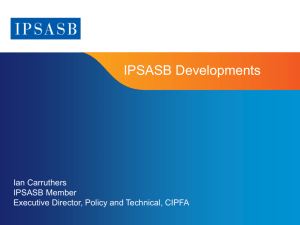
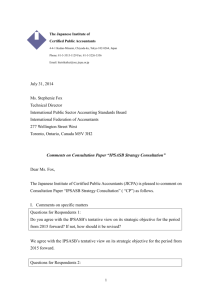
![Strategic Report * [Insert Board/Committee Acronym here]](http://s3.studylib.net/store/data/009757854_1-7855a7d89bd9fbeb299750104722b602-300x300.png)
